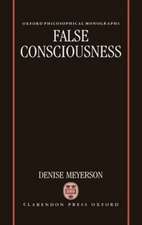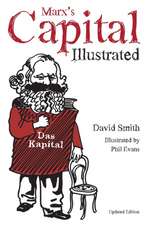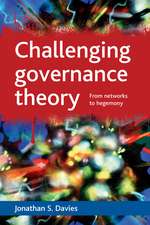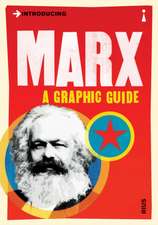Capital as a Social Kind: Definitions and Transformations in the Critique of Political Economy: Routledge Frontiers of Political Economy
Autor Howard Engelskirchenen Limba Engleză Hardback – 28 feb 2011
The book argues that, provoked by his study of Aristotle, Marx’s attentions foreshadowed contemporary themes in the realist philosophy of science. Importantly, social kind analysis is relevant not only to understanding his critique of political economy but illuminates also a materialist study of law, justice, morality and the transition to socialism. Social kind analysis also opens a path for the development of today’s moral realism by suggesting the need for a systematic study of the causal structures of social life. In this respect the importance of normative themes in Marxism is defended against claims that the Marxist tradition lacks the resources to call capitalism unjust or to defend morality and human rights.
The origin of capital, Marx suggests, can be found in the rupture of an original unity between the laborer and the means of labor, and the book explores the way a structure of separations best characterizes capital as a social kind. This uncovers a little developed emphasis in Marx’s work – his focus on the phenomena of separation that define our lives and also on forms of association required to transcend them. Given that capitalism has made the instruments of labor instruments of social labor, forms of association that would recover worker control over them must be democratic. The transition to socialism, the book concludes, just is winning the battle of democracy. This book will be of interest to students and researchers of economics, philosophy and indeed any social science subject.
Din seria Routledge Frontiers of Political Economy
-
 Preț: 309.90 lei
Preț: 309.90 lei -
 Preț: 309.79 lei
Preț: 309.79 lei -
 Preț: 316.03 lei
Preț: 316.03 lei -
 Preț: 310.55 lei
Preț: 310.55 lei - 9%
 Preț: 866.82 lei
Preț: 866.82 lei -
 Preț: 311.87 lei
Preț: 311.87 lei -
 Preț: 311.61 lei
Preț: 311.61 lei -
 Preț: 286.99 lei
Preț: 286.99 lei -
 Preț: 327.83 lei
Preț: 327.83 lei -
 Preț: 386.12 lei
Preț: 386.12 lei - 9%
 Preț: 938.48 lei
Preț: 938.48 lei -
 Preț: 302.76 lei
Preț: 302.76 lei -
 Preț: 151.97 lei
Preț: 151.97 lei -
 Preț: 318.54 lei
Preț: 318.54 lei -
 Preț: 317.95 lei
Preț: 317.95 lei -
 Preț: 310.01 lei
Preț: 310.01 lei -
 Preț: 326.49 lei
Preț: 326.49 lei -
 Preț: 155.44 lei
Preț: 155.44 lei -
 Preț: 309.79 lei
Preț: 309.79 lei -
 Preț: 152.67 lei
Preț: 152.67 lei -
 Preț: 328.76 lei
Preț: 328.76 lei -
 Preț: 281.72 lei
Preț: 281.72 lei -
 Preț: 286.58 lei
Preț: 286.58 lei -
 Preț: 325.09 lei
Preț: 325.09 lei -
 Preț: 353.78 lei
Preț: 353.78 lei -
 Preț: 371.95 lei
Preț: 371.95 lei -
 Preț: 310.95 lei
Preț: 310.95 lei -
 Preț: 324.87 lei
Preț: 324.87 lei -
 Preț: 312.86 lei
Preț: 312.86 lei -
 Preț: 374.16 lei
Preț: 374.16 lei -
 Preț: 329.09 lei
Preț: 329.09 lei -
 Preț: 348.22 lei
Preț: 348.22 lei - 28%
 Preț: 1047.06 lei
Preț: 1047.06 lei - 18%
 Preț: 1169.45 lei
Preț: 1169.45 lei - 18%
 Preț: 1555.17 lei
Preț: 1555.17 lei - 18%
 Preț: 1048.43 lei
Preț: 1048.43 lei - 18%
 Preț: 1059.84 lei
Preț: 1059.84 lei - 31%
 Preț: 767.47 lei
Preț: 767.47 lei - 18%
 Preț: 731.92 lei
Preț: 731.92 lei - 26%
 Preț: 822.54 lei
Preț: 822.54 lei - 18%
 Preț: 1796.21 lei
Preț: 1796.21 lei - 26%
 Preț: 1184.91 lei
Preț: 1184.91 lei - 18%
 Preț: 1120.23 lei
Preț: 1120.23 lei - 15%
 Preț: 700.95 lei
Preț: 700.95 lei - 18%
 Preț: 1116.31 lei
Preț: 1116.31 lei - 22%
 Preț: 299.52 lei
Preț: 299.52 lei - 18%
 Preț: 999.46 lei
Preț: 999.46 lei
Preț: 822.54 lei
Preț vechi: 1142.03 lei
-28% Nou
Puncte Express: 1234
Preț estimativ în valută:
157.41€ • 163.73$ • 129.95£
157.41€ • 163.73$ • 129.95£
Carte tipărită la comandă
Livrare economică 12-26 aprilie
Preluare comenzi: 021 569.72.76
Specificații
ISBN-13: 9780415776912
ISBN-10: 0415776910
Pagini: 240
Dimensiuni: 156 x 234 x 18 mm
Greutate: 0.6 kg
Ediția:1
Editura: Taylor & Francis
Colecția Routledge
Seria Routledge Frontiers of Political Economy
Locul publicării:Oxford, United Kingdom
ISBN-10: 0415776910
Pagini: 240
Dimensiuni: 156 x 234 x 18 mm
Greutate: 0.6 kg
Ediția:1
Editura: Taylor & Francis
Colecția Routledge
Seria Routledge Frontiers of Political Economy
Locul publicării:Oxford, United Kingdom
Public țintă
Postgraduate and UndergraduateNotă biografică
Howard Engelskirchen is a lawyer and a philosopher who has previously taught at the University of Santa Clara, Western State University College of Law, the University of Hawaii, Iowa State University and Union College, USA.
Recenzii
‘This is a very important book. It not only makes a distinctive and original contribution to Marxism, it is also important for philosophers of science and moral theory. Marx’s dialectical materialism fits into neither of the prevailing conceptions of inquiry: reductionist, ahistorical, atheoretical positivism or postmodernist constructivism. Engelskirchen articulates on Marx’s behalf a sophisticated non-reductionist materialism grounded in the contemporary philosophy of science, philosophy of language and the metaphysics of natural kinds. The question of Marx aside, Engelskirchen’s realist conception of social science is a fundamental contribution to the literature of the philosophy of science and will be of interest to anyone who, in pursuing the study of complex phenomena, seeks to avoid a forced choice between positivism and postmodernism.
The book will be equally important for philosophers interested in moral theory. Marx is a deep critic of bourgeois moral and legal values but his normative concerns are also in some sense continuous with the values he criticizes. This is the classic question of commensurability/incommensurability in the sense of Kuhn. Engelskirchen’s treatment is a marvel of dialectical sophistication. He brilliantly extends his non-reductionist approach to the epistemology and semantics of natural kinds to illuminate the respects of continuity and difference between bourgeois and Marxist normative conceptions. Here too the results will be important to those who until now may have paid little attention to Marx. Anyone interested in how normative conceptions change over time will find in Engelskirchen’s approach a convincing alternative to relativist conceptions.’
- Dr. Richard Boyd, Susan Linn Sage Professor of Philosophy at Cornell University, USA
The book will be equally important for philosophers interested in moral theory. Marx is a deep critic of bourgeois moral and legal values but his normative concerns are also in some sense continuous with the values he criticizes. This is the classic question of commensurability/incommensurability in the sense of Kuhn. Engelskirchen’s treatment is a marvel of dialectical sophistication. He brilliantly extends his non-reductionist approach to the epistemology and semantics of natural kinds to illuminate the respects of continuity and difference between bourgeois and Marxist normative conceptions. Here too the results will be important to those who until now may have paid little attention to Marx. Anyone interested in how normative conceptions change over time will find in Engelskirchen’s approach a convincing alternative to relativist conceptions.’
- Dr. Richard Boyd, Susan Linn Sage Professor of Philosophy at Cornell University, USA
Cuprins
Part 1: Definitions 1. Introduction: Social Kinds in Social Theory 2. Why is This Labor Value? – Commodity Producing Labor as a Social Kind (Appendix: Backhaus and the Analysis of Capital’s First Chapter) 3. Separation and Subordination: The Real Definition of Capital as a Social Kind 4. The Concept of Capital in The Grundrisse Part 2: Transformations 5. Value and Contract Formation (Appendix: Value as a Social Kind) 6. What Ought to Be Done: Marxism and Normativity 7. Winning the Battle of Democracy
Descriere
Drawing on the rich examples offered by Marx’s analysis of capital and exploring a methodology that will be of interest to both Marxist and non-Marxist social theorists alike, Capital as a Social Kind extends this approach to the study of social life.














